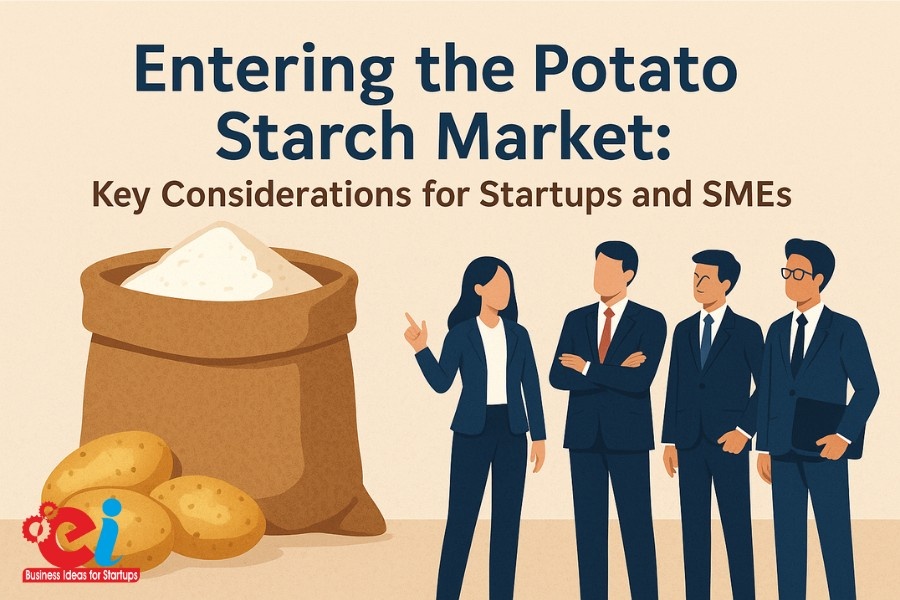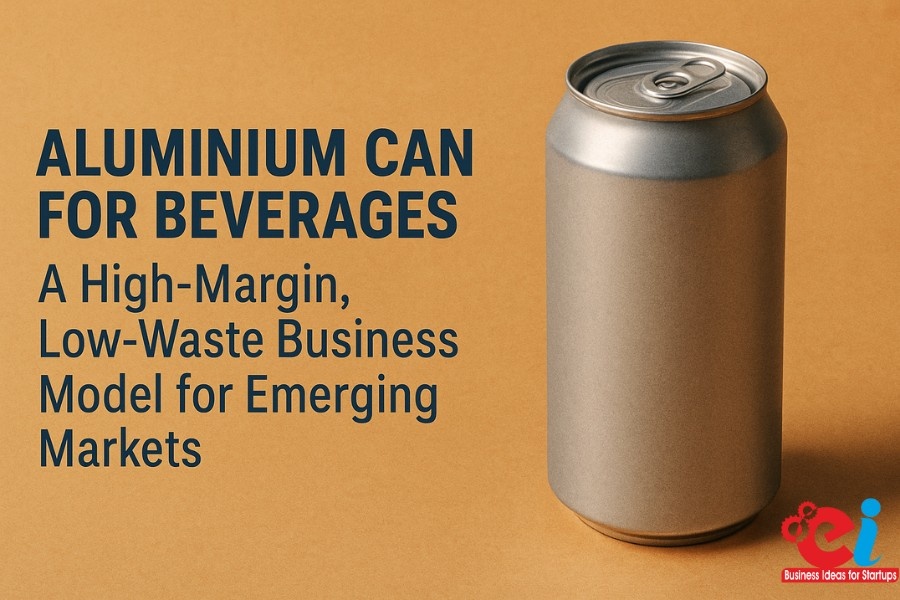Reasons pertaining to the ever-increasing incorporation of gluten-free, plant-based, and clean label components into the diet are remarkably accelerating the growth of the potato starch industry. Obtained through mechanical extraction and drying of tubers, potato starch is a multifaceted raw material employed in various sectors, including food and beverage, pharmacy, textiles, paper, and even adhesives. As a result of heightened consumer demand for healthy and sustainable options, this plant-derived thickener is favored over other cereal-based starches and synthetic additives.
Other than benefiting large enterprises, this sector’s gaps in the potato starch market serve as an advantage for small-to-medium enterprises (SMEs). Currently estimated at USD 4.5 billion, the potato starch market is projected to foster its CAGR above 5% by 2032. With India being one of the largest producers of potatoes, the country is in a favorable position to emerge as a leading processor and exporter of starch derivatives. Lower startup costs relative to other agri-processing ventures make this sector highly appealing and accessible for SMEs to meet the rising demand for functional ingredients.
Understanding the Flow of the Market
The starch market of potatoes is segmented into two subsections, which are native starch and modified starch. Unmodified native starch, which has not undergone any food processing alteration, is frequently used in the preparation of soups, sauces, baked goods, confectionary, and noodles among others. On the other hand, modified potato starch, is used after some level of chemical, physical, or enzymatic alteration done to it for enhanced properties. The starch is useful for industrial starchs in specialised adhesives, paper sizing, oil drilling, and even textile finishing because of its improved viscosity, gel stability, and resistance to heat or acid.
There is an opportunity for the market with shift towards clean label and non-gmo products. There is a majority customer base who focus on the ingredient list and the processors are adopting less refined non-gmo starches. This increased demand for potato starch, particularly for use in premium foods and personal care products.
The previously stated trends of health and wellbeing, coupled with the continuous increase in the amount of starch used in materials such as bio-based plastics and other non-food biodegradable sustainable packaging, is widening the range of options to be targeted by companies venturing into the market.
The Context of Technology and The Method of Production
There is a unique procedure for establishing a potato starch factory that starts from potatoes and involves washing, rasping, separating, purifying, dehydrating, and drying. The first step involves cleaning and rasping the potatoes so that the starch granules are freed. Separation of the granules from fibrous pulp is done either with a centrifugal sieve or a hydrocyclone. Finally, some steps include dewatering and drying the refined granular starch till aged protein and fibrous impurities are apart and returns in powder form.
Particular attention should be paid to the cost-effective and easily-scalable machinery made for energy conservation, especially by small and medium enterprises (SMEs) and startups. The following are the basic required machines:
The small scale units can reach a capacity of 1-5 tonnes per hour, whereas the industrial setups are capable of exceeding 20 tonnes per hour. The yield alongside profitability is affected by the quality of raw materials like the potatoes’ starch content (usually 15-20%). It is important for rotating contracted farmers or cooperatives to focus on sourcing higher starch potatoes, and put resources towards maintaining uninterrupted dedicated production.
Related: How to Manufacture Starch and Its Derivatives (Wheat Starch, Maize Starch, Rice Starch, Potato Starch, etc.)
Utilities, Location, and Infrastructure
Strategically, the geographic location of the plant is of utmost importance to operational efficiency and profitability. Also, regionally close proximity of potato growing areas becomes pertinent for the potato starch processing unit as fuels efficiency while lowering transportation costs along with post-harvest losses. Ideal states are those with bountiful potato production together with rural infrastructure and these would include Uttar Pradesh, Bihar, Gujarat, Punjab, and Madhya Pradesh.
The warehouses used for potato storage must have an adequate amount of clean water as well as electricity. In addition, there must be a functional sewage system for waste disposal. The warehouse also needs to follow the Pollution Control Board guidelines, especially concerning the organic wastewater discharge from starch extraction systems, which contain significant organic waste.
Market Entry Strategy and Business Model
There are numerous options available to small startups and medium scale enterprises concerning market entry. However, the business model can include, but is not limited to, the following:
B2B sales: The primary focus here would be selling to food processors, although starch has a market amongst paper, pharmaceutical, and packing firms.
Retail packaging: Sells potato starch under a known brand name through retail and e-commerce outlets which directly sell to customers.
Contract manufacturing: Also referred to as third-party agreements, this involves supplying starch to established brands that outsource their production.
Export focus: Ship directly to certain countries in South-East Asia, Africa, and the Middle East, as they have emerging markets that require high supplies of potato starch.
Adopting both retail and B2B approaches simultaneously has the potential to increase revenue while also decreasing over-dependence on one sector. However, small businesses can better market gluten-free certified premium native starches, especially the low-moisture ones, by branding them as organic or specialty products.
Regulatory and Certification Requirements
Meeting safety and quality control standards is vital for accessing valuable markets. Starch units in India must align with the directives of the Food Safety and Standards Authority of India (FSSAI). Other certifications such as ISO 22000 and HACCP are not obligatory, but with an increasing focus on exports, these and GMP certification become highly desirable.
Exporters have to meet phytosanitary and labeling standards of the target market. The United States and European Union countries are particularly strict with residue chemicals, microbial contamination, and constituents of the package information.
Starch Utilization for Industries must comply with BIS (Bureau of Indian Standards) and obtain a Pollution Control Certificate for the specifications outlined by BIS.
Challenges and Risk Avoidance
Regardless of the fact that the potato starch industry has plenty of opportunities, there remains some operational and market issues that need to be solved by a new startup. There are risks like potato price fluctuation, seasonal changes in starch content, supply chain challenges, and competition from corn, tapioca or wheat starches.
To address the issues above, SMEs can change the sources of raw materials, wanted farmers to sell their output through long term agreements, invest in cold storage facilities to extend the duration of processing, and develop more advanced tasuch products. Incorporating the use of TASUCH products also helps to achieve accuracy in processes, reduce waste, and enhance control over the quality of the final products.
Enhancing relations with food wholesalers and chains and pharmacies cultivate an inorganic demand for starch products allowing the seller to achieve stable sales volumes and sales becoming more steady.
How NIIR Project Consultancy Services Can Help
Veterans as well as nascent Startups can take advantage of strategized execution in the highly lucrative potato starch industry. NIIR Project Consultancy Services (NPCS) offers meticulous project-focused assistance tailored to the specific needs of entrepreneurs wanting to setup starch processing units. With over four decades of experience in industrial consultancy, NPCS specializes in:
- Market Survey cum Detailed Techno-Economic Feasibility Reports
- Preparation of Plant layout and machine specifications
- Financial modeling, estimating, costing, and analyzing profitability
- Devising strategies for raw material procurement, vendor sourcing, strategic sourcing
- Export potential analysis, legal regulation guidance, and consultancy
- Implementation of the project from beginning to end (turn-key)
The feasibility reports that NPCS provides focus on market dynamics and trends, the scale of investment, ROI projections, breakeven forecasts, and risk evaluation analyses. Due to the fact that these reports are accepted by several banks and other government institutions, they are very useful when applying for loans, subsidies, and approvals.
NPCT takes care of everything, from concept to commissioning for both 1 TPH pilot units and 10 TPH commercial plants.
Related: How to Start a Gluconic Acid Production Business from Potato
Conclusion
The growing demand for natural, functional, and versatile starches makes potato starch a highly attractive business opportunity for startups and SMEs. With applications ranging from food processing to biodegradable plastics and pharmaceuticals, the potential for expansion is enormous. Coupled with India’s strong agricultural base, rising domestic demand, and global interest in plant-based ingredients, this is the right time to enter the market.
However, success requires careful planning—starting from raw material procurement and production technology to market positioning and regulatory compliance. Partnering with an expert organization like NIIR Project Consultancy Services (NPCS) provides the competitive edge needed to launch and scale a profitable potato starch venture.

















